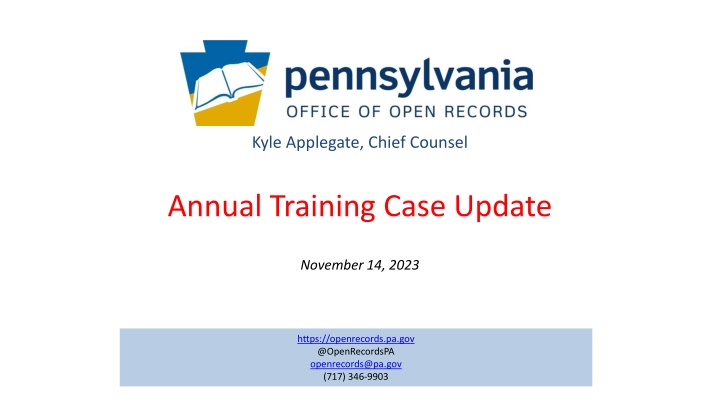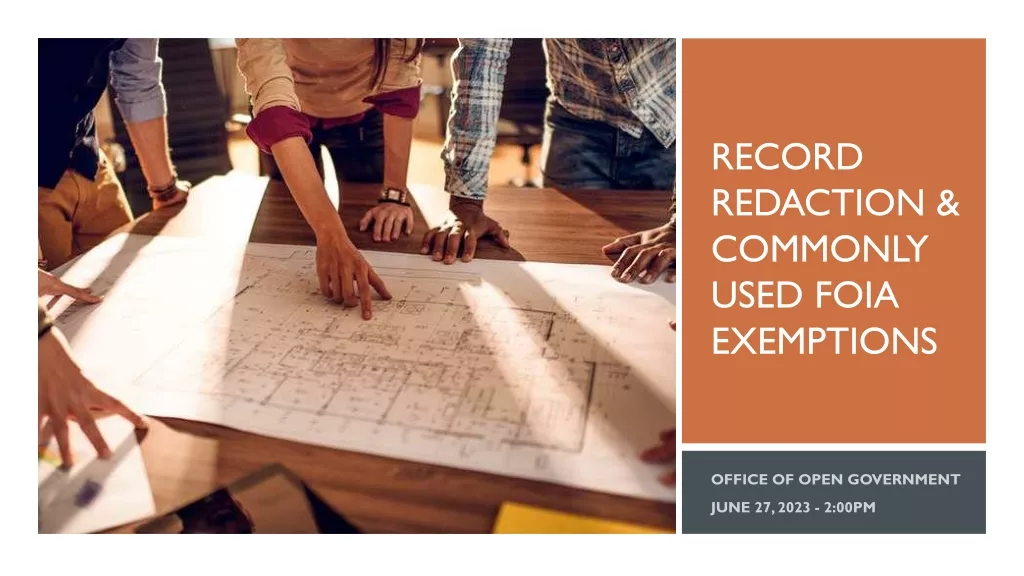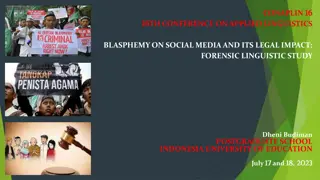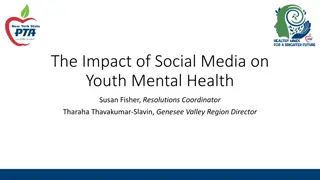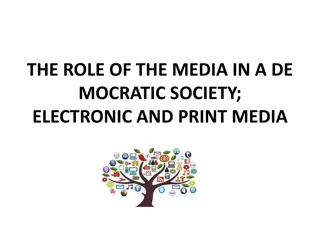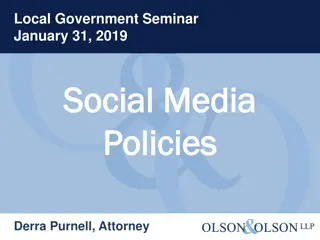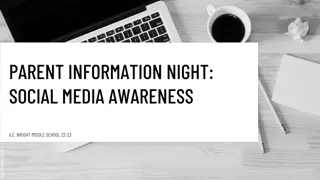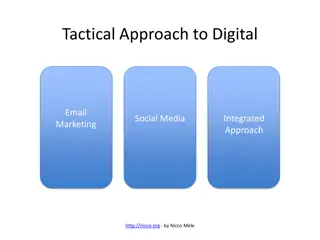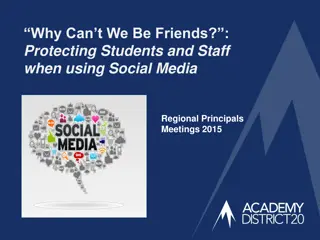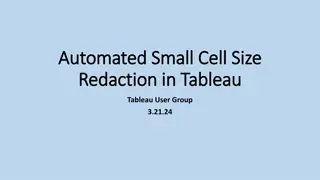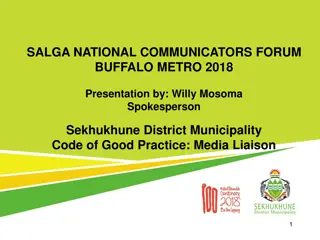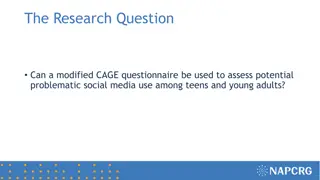Legal Updates on Electronic Redaction and Social Media Use in Pennsylvania Schools
Annual training case update on key legal decisions regarding electronic redaction of video records in schools and the use of social media by school board members in Pennsylvania. The update highlights court rulings, guidelines, and considerations related to the handling of electronic records and social media activities in educational institutions.
Download Presentation

Please find below an Image/Link to download the presentation.
The content on the website is provided AS IS for your information and personal use only. It may not be sold, licensed, or shared on other websites without obtaining consent from the author.If you encounter any issues during the download, it is possible that the publisher has removed the file from their server.
You are allowed to download the files provided on this website for personal or commercial use, subject to the condition that they are used lawfully. All files are the property of their respective owners.
The content on the website is provided AS IS for your information and personal use only. It may not be sold, licensed, or shared on other websites without obtaining consent from the author.
E N D
Presentation Transcript
Kyle Applegate, Chief Counsel Annual Training Case Update November 14, 2023 https://openrecords.pa.gov @OpenRecordsPA openrecords@pa.gov (717) 346-9903
Case Law Update: Electronic video redaction Cent. Dauphin Sch. Dist. v. Hawkins, 286 A.3d 726 (Pa. 2022) Because a school bus surveillance video was an education record covered by FERPA, the school district was directed to provide a copy of the video with students images redacted. Each level of court review rejected the school district s claim that electronic redaction was outside of its capabilities. The Supreme Court noted it is clear Section 706 of the RTKL mandates agencies like the District to redact information exempt from disclosure and does not give them discretion in this regard; they are simply required to comply with the law. Agencies are required to explain why electronic redaction of video records is impossible. 11/14/23 Annual Training Case Update 3
Case Law Update: Facebook/Social Media Penncrest Sch. Dist. v. Cagle, 293 A.3d 783 (Pa. Commw. Ct. 2023) (en banc) Request sought FB posts and FB comments by school board members related to LGBTQ issues following a news article featuring several such posts about one of the school libraries. OOR applied a test it had used for several years: did the FB page serve as a significant platform for the agency to conduct any official business? OOR granted access to the records, finding that the school board members made regular use of FB to discuss official business with constituents. The trial court affirmed, reasoning that it does not matter whether the FB posts were made on the Board s FB account or the members private FB accounts. 11/14/23 Annual Training Case Update 4
Case Law Update: New Test for Social Media Platforms The Commonwealth Court disagreed with the trial court s reasoning, stating that we must consider the following nonexclusive factors : Does the FB page have the trappings of an official agency account? Is it marked public or private? Also look to the FB page s contents, not just its appearance or purpose Does the FB page document a transaction or activity of an agency? Must review the content of the posts to determine Was the FB page produced under the agency s authority or subsequently ratified, adopted, or confirmed by the agency? Did the agency require or direct the posts? Did the posts further the agency s interests? Ultimately, context is very important to the analysis. 11/14/23 Annual Training Case Update 5
Case Law Update: Facebook/Social Media Wyoming Borough v. Boyer, 299 A.3d 1079 (Pa. Commw. Ct. 2023) (en banc) Request sought information concerning the Mayor of the Borough s FB page The OOR found that the page was a record of the Borough, noting that it was categorized as a PublicFigure page; was titled Joseph Dominick Mayor of Wyoming ; and, most importantly, mostly contained content discussing Borough business. The trial court reversed the OOR. Citing the Cagle opinion, the Commonwealth Court vacated and remanded back to the trial court for an analysis under Cagle. However, the Court noted the Mayor used the Facebook page in an official manner, and that mayors have greater authority to bind the agency, ultimately concluding that case law more strongly supports the disclosure of a borough mayor s social media activities. 11/14/23 Annual Training Case Update 6
Case Law Update: Prothonotaries Scolforo v. County of York, 298 A.3d 193 (Pa. Commw. Ct. 2023) Request for the names, salary, job titles, and length of service of employees of the York County Prothonotary s Office. The OOR dismissed the appeal for lack of jurisdiction, reasoning that the Prothonotary is a judicial agency, and that the OOR is unable to grant access to records of a judicial agency. The Commonwealth Court held that: o Prothonotaries are judicial agencies under the RTKL and their staff are personnel of the Unified Judicial System o Even if possessed by the County, a local agency, the records are judicial records because they document the activities of a judicial agency o Only financial records are available from a judicial agency under the RTKL; however, the information, including length of service, is a financial record 11/14/23 Annual Training Case Update 7
Case Law Update: Narrowly Construed Exemptions PUC v. Nase, No. 514 C.D. 2022, 2023 Pa. Commw. LEXIS 140 (Pa. Commw. Ct. 2023) Request for records concerning a water company represented by the Requester. The OOR, after an in camera review, granted the appeal in part. The Commonwealth Court held that: o The notes and working papers exemption, 65 P.S. 67.708(b)(12), covers those records retained solely for the convenience of individual officials Records used to facilitate the daily activities of a team or working group are not covered under the exemption Meanwhile, emails between employees exchanging information or containing discussion are not covered by the exemption o Records are not exempt under the internal, predecisional deliberation exemption, 65 P.S. 67.708(b)(10)(i)(A), simply because they would show that the agency engaged in a deliberation o Records are not protected by the attorney-client privilege simply because they reflect that someone within the agency sought and received legal advice; the records must actually contain privileged information Exemptions are to be construed narrowly, and agencies must provide sufficient evidence demonstrating how a specific record falls under an exemption. 11/14/23 Annual Training Case Update 8
Case Law Update: Coroner Records Allegheny County v. Hailer, 298 A.3d 476 (Pa. Commw. Ct. 2023) Request for autopsy and toxicology reports. The Coroner s Act sets fees for certain coroner records. 16 P.S. 1252-B. The OOR granted the appeal based upon this section, but the trial court reversed, finding this section only permitted disclosure of the records in the event that a nongovernmental agency sought the information for the purpose of investigating an insurance claim or determining liability for the death of the decedent. However, the Commonwealth Court found that the section does not limit who can obtain the records for the quoted fees. [T]he General Assembly intended that coroner records would be publicly accessible, provided the appropriate fee was paid. 11/14/23 Annual Training Case Update 9
Case Law Update: Retirement v. Discharge Fruchter v. Borough of Malvern, Nos. 495 C.D. 2022, 496 C.D. 2022; 2023 Pa. Commw. LEXIS 156 (Pa. Commw. Ct. 2023) Request sought documents referenced in a Retirement Agreement between the Borough and a police sergeant, who was the subject of disciplinary proceedings. The OOR concluded that the documents were contained in the employee s personnel file and related to employee discipline, and did not constitute the final action resulting in demotion or discharge. 65 P.S. 67.708(b)(7)(viii). The trial court affirmed, finding that neither the Retirement Agreement nor the documents referenced within effectuated a demotion or discharge. The Commonwealth Court found that the referenced documents are not necessary to decipher the Retirement Agreement, and noted that the fact that a document is attached or referenced to a document does not subject it to disclosure. The Court also found that the Retirement Agreement was not the finalaction resulting in the sergeant s discharge. The Court, noting that discharge is not defined by the RTKL, noted that anemployee s retirement is a voluntary resignation by his own choice, while discharge is typically initiated by his employer. Thus, a decision to retire by agreement is not a discharge. 11/14/23 Annual Training Case Update 10
Case Law Update: Untimely Appeals from the OOR Bethke v. City of Philadelphia, 282 A.3d 884 (Pa. Commw. Ct. 2023) Request sought all policies from the Sheriff s Office OOR granted, and the City failed to appeal the Final Determination within 30 days Requester filed for mandamus, and the Court of Common Pleas directed the City to cross-appeal nunc pro tunc to address security concerns Commonwealth Court holds that failure to timely appeal the OOR s Final Determination requires an extraordinary circumstance such as fraud, administrative breakdown, or some other circumstance unrelated to negligence. [I]t is the procedural circumstances, not the merits or perceived importance of the case, that must be extraordinary to warrant relief. 11/14/23 Annual Training Case Update 11
Unreported Opinions Unreported opinions of the Commonwealth Court are not binding precedent, but may be cited for their persuasive value
Case Law Update: The RTKL provides an adequate statutory remedy Duquette v. Office of Open Records, No. 84 M.D. 2022 (Pa. Commw. Ct. 2023) After an OOR Appeals Officer issued a Final Determination, a requester sought mandamus, declaratory, and injunctive relief against the OOR concerning issues that arose during the appeal before the OOR. The Commonwealth Court granted the OOR s preliminary objections, finding that the requester s claims stem from the [OOR s] issuance of its Final Determination, and that the requester could have obtained such relief by appealing the Final Determination to common pleas. This relief is adequate, as the RTKL provides requesters with a right to a de novo appeal. Therefore, the Court found that there was an adequate statutory remedy. 11/14/23 Annual Training Case Update 13
Case Law Update: Sufficiency of evidence Mack v. Pa. Dep t of Corrections, No. 699 C.D. 2022 (Pa. Commw. Ct. 2023) Request sought (in part) a financial record; agency argued that it does not exist. On appeal, AORO submitted an affidavit explaining that another employee was likely to have such records but had confirmed that she did not. The Commonwealth Court held that this language was insufficiently certain to find that the records don t exist. The Court in this instance took issue with the use of the word likely and noted that the fact that the agency located another record after claiming it did not exist should have alerted the OOR to question the veracity of the agency s evidence. 11/14/23 Annual Training Case Update 14
Case Law Update: Severance payments Allegheny County Airport Auth. v. Belko, No. 117 C.D. 2023 Request for severance payments made to former Authority employees. Past public expenditures are no different than current public expenditures, such as salaries, and there is no expectation of privacy in one s receipt of public funds. The Court, quoting a prior Supreme Court case: [A]ny person desiring to keep his or her name and relevant financial data private should refuse Commonwealth disbursements . The public has a right to know how the Commonwealth spends its money. Therefore, the constitutional right to privacy did not apply. 11/14/23 Annual Training Case Update 15
Case Law Update: Mug Shots In re Mezzacappa, No. 1229 C.D. 2021 Request for mug shots taken at the County prison. Mug shots are not prohibited from being disclosed under the Criminal History Record Information Act ( CHRIA ), and are not exempt under the RTKL s investigative exemptions. 11/14/23 Annual Training Case Update 16
Case Law Update: What is an agency? Pysher v. Clinton Twp. Volunteer Fire Co., No. 766 C.D. 2022 (May 24, 2023) (unreported) Request for various financial records, payments, loans, meeting minutes, etc. The Fire Co. denied the Request, arguing that it was not a government agency under the RTKL. This case applied the test previously set forth by the Commonwealth Court in an earlier Pysher opinion, 209 A.3d 1116, to determine that. August 2023 Cumberland County Bar Association 17
Case Law Update: What is an agency? Prior case established a three part test: 1. How much control does gov t have? 2. How much public money? 3. Does it have a governmental purpose? The OOR applied this test and found that the Fire Co. was not an agency. Court of Common Pleas reversed, persuaded that the combination of the Fire Co. s essential governmental function and large volume of public funds made it an agency. August 2023 Cumberland County Bar Association 18
Case Law Update: What is an agency? Commonwealth Court endorses the lower court s application of the test. Emphasizes the public function of the Fire Co. and the fact that the majority of its money was from municipal contracts. The Fire Co. admitted that it would cease to exist without government financial support. Although the municipalities did not formally appoint most of its members, they nevertheless had significant power to audit or curtail the Fire Co. August 2023 Cumberland County Bar Association 19
OOR Case Law Index Can be found at https://www.openrecords.pa.gov/Documents/RTKL/RTKL_Case_Index.pdf Final Determinations as well as subsequent case law can be located on the OOR s dockets at: https://www.openrecords.pa.gov/Appeals/DocketSearch.cfm August 2023 Cumberland County Bar Association 20
Specificity and the RTKL Specificity and the RTKL
Disclaimers This presentation is not legal advice and not binding authority Definitive answers may not always exist reasonable minds may differ Facts of each individual case are very important case by case analysis Specificity Goal To give you some tips and discuss the legal factors and three-part test used by OOR and the courts in determining whether a request is sufficiently specific To give you the tools to apply the relevant test factors and reach a reasonable conclusion or draft a reasonable request that is specific To give you additional resources
Use common sense Be polite Don t unnecessarily complicate the process General Observations
Section 703: A written request should identify or describe the records sought with sufficient specificity to enable the agency to ascertain which records are being requested and shall include the name and address to which the agency should address its response Purpose of specificity Do you know what they are requesting what records/information do they want Purpose of Specificity
Burdensome (volume) does not equate to insufficiently specific but may be a factor General Observations A request may be sufficiently specific even though it requests broad categories of records
Use of the word all does not render automatically insufficiently specific but not limited to and any and all do raise specificity questions A request can be partially specific Records can be given without waving the lack of specificity argument Example: Any and all records, files, or manual(s), communication(s) of any kind [related to vehicle stops]." Manual(s) is only part that is specific Pa. State Police v. Office of Open Records, 995 A.2d 515, 516 (Pa. Commw. Ct. 2010) General Observations
Caution: If you rely completely on a lack of specificity argument and you are overruled, you will likely waive any ability to raise exemptions. The fact that there might be protected information buried in the amassed emails was insufficient. Agency should have ascertained the emails status as records and reviewed them for the presence of exemptions and protected information. Consequently, it is simply too late to seek redaction of the emails or to argue that any of them do not constitute records subject to disclosure. Danger of Only Arguing Specificity
Three-part balancing test Dept. of Education v. Pitt. Post Gazette, 119 A.3d 1121 (Pa.Cmwlth. 2015) Request: all of the emails of the Acting Secretary of Education as they pertain to the performance of her duties as Acting Secretary since she was appointed on Aug. 23, 2013 to date (Aug. 5, 2014) Subject matter Must identify the transaction or activity of the agency for which the record is sought Should provide a context to narrow the search Scope of documents Must identify a discrete group of documents either by type or recipient Timeframe for which records sought (most fluid of 3) Should identify a finite period of time The Three- Part Test
Describes a transaction, incident, activity, event, topic, action or other agency business that is contained in, discussed in, or relates to the records you are requesting An open-ended request that gives an agency little guidance regarding what to look for may be so burdensome that it will be considered overly broad Specificity must be construed in the request s context rather than envisioning everything that the request might conceivably encompass example There are no judgments to be made as to whether the documents are 'related' to the request Subject Matter
The request should explain the specific type or kind of records you are requesting. (e.g., e-mails, reports, formal decisions, video footage, etc.) The request should seek records by naming the recipient(s) and/or sender(s). (where possible) Scope
The request should identify a finite period of time. If that finite period of time is lengthy, does the rest of the request allow the agency to identify the specific records/information you are requesting? If there is no timeframe, does the rest of the request give enough detail to allow the agency to identify the specific records/information you are requesting? How much time is too broad? Depends on the facts. Baxter does not stand for the proposition that a RTKL request that is limited to a short timeframe is always, by itself, sufficiently specific. Keystone Nursing & Rehab. of Reading, LLC v. Simmons-Ritchie (Pa. Cmwlth., Nos. 1631, 1692, and 1696 C.D. 2018, filed January 3, 2020), appeal denied, (Pa., No. 167 MAL 2020, filed September 16, 2021), slip op. at 40. Timeframe
Keywords usually add more confusion than clarity OOR encourages Requesters not to use them The fact that a request uses keywords in place of a subject matter is not necessarily fatal to the request, but broad keywords alone do not provide a sufficient limiting context. See Montgomery County v. Iverson, 50 A.3d 281, 284 (Pa. Commw. Ct. 2012) ("incredibly broad" search terms do not provide a limiting subject matter) Specificity: Keywords The OOR has found keyword lists specific where they relate to well-known matters of agency business and the request identifies senders and recipients. The OOR has previously found that a request for a keyword search where the keywords do not reasonably involve some business of an agency, over the course of nineteen months, was insufficiently specific.
Agency do you know how to correctly and accurately run searches? Outlook Excel PDF Online emails Text messages Word Windows Cloud Technology and Keyword Searches
Case Law: Specificity Borough of Pottstown v. Suber- Aponte, 202 A.3d 173 (Pa. Commw. Ct. 2019) police video footage [(footage)] on October 4, 2015 of herself . . . from the time [she was] brought in [to the police department (Department)] and all activity at [the Department] that day. Specific? Yes Why? - The Request clearly identifies the subject matter of the request (Department activity and Requester), the scope of records sought (video surveillance footage) and a specific timeframe (October 4, 2015 - a single day) - Moreover, the Borough's denial clearly reflects the Borough's knowledge of which footage would be responsive to the Request
Case Law: Specificity Why not? Specific? No OIG v. Brown, 152 A.3d 369 (Pa. Commw. Ct. 2016) Request: OIG s rules, regulations, policies or related authority that governs its duties and functions, that were specifically designed by the OIG - The Request does not provide any context by which it can be narrowed. No subject matter identified. No category or type of OIG activity, duty, function, or transaction - Is basically for authorities that govern all OIG activity. This also calls for a legal conclusion or interpretation. - Unreasonable burden to require OIG to examine all its rules, regulations, and policies and related authority without knowing with sufficient specificity what OIG business or activity the request contemplates
Case Law: Specificity Did not use the three part balancing test but same basic elements DOC v. ABC 27 St. Hilaire, 128 A.3d 859 (Pa. Commw. Ct. 2015) All records that document inmate injuries/deaths from January 2009 through December 2014. I would also like all records that document employee injuries/deaths while on the job from January 2009 through December 2014. Specific? Yes - The request sufficiently informs the agency of the records requested - This is a clearly defined set of documents i.e. records that document inmate injuries a specific subject for the period from January 2009 through December 2014 a specific time period - Burdensome does not deem a request overbroad
Case Law: Specificity Philly DA v. Bagwell, 155 A.3d 1119 (Pa. Commw. Ct. 2017) All e-mails, letters and memos pertaining to the [District Attorney s] transition from Lotus Notes e-mail platform to the Microsoft Exchange e- mail platform between January 1, 2013 and December 31, 2013 Specific? Yes (great discussion on specificity with relevant cases) - Seeks a clearly defined universe of documents - Defined the scope by the type of documents sought - Timeframe is finite.
Case Law: Specificity and Context Carey v. DOC, 61 A.3d 367 (Pa. Commw. Ct. 2013) Transfers were from 2008 - 2012 Specific? Yes - All of the records are specified by subject matter and a finite timeframe (date-2008-2012) Part 2 All documents/ communications which may is vague but coupled with the fact that the transfer is well known to DOC, it is sufficiently specific - 2. All documents/ communications which may indicate the individual[s] or agencies who authorized said transfers.
Case Law: Specificity Dept. of Education v. Pitt. Post Gazette (Legere), 50 A.3d 265 (Pa. Commw. Ct. 2012) (Request was filed on September 6, 2011) Determination letters issued since January 1, 2008 as well as orders to well operators in relation to determination letters as described in 208 of Gas Act Specific? Yes - Specific types of documents requested (letters and orders) Clearly defined universe of documents No judgments as to whether documents are related Agency provided some records goes toward specificity Burdensome does not equate to not specific but may be a factor Agency's method of tracking, cataloguing, storing and organizing its record that prevents easily retrieval should not be held against the requester - - - - -
Case Law: Specificity and Keywords Montgomery County v. Iverson, 50 A.3d 284 (Pa. Commw. Ct. 2012) Pursuant to section 102 of the Commonwealth of Pennsylvania's Right-to- Know law, I am requesting an electronic copy of all email records to and from the <montcopa.org> mail domain, to and from the <septa.org>, <dvrpc.org>, <pahouse.net[#x3ec] and <pasenate.com> domains, WHERE The email subject and body contain the following terms: A long list of terms was included Specific? No - Open ended request that gives little guidance MAY be so burdensome that it will be considered overly broad A request may be sufficiently specific even though it requests broad categories of records Specificity must be construed in the requests context rather than envisioning everything that the request might conceivably encompass Did not have timeframe, did not identify individuals, email addresses or even departments - - -
Case Law: Specificity Office of the Governor v. Engelkemier, 148 A.3d 522 (Pa. Commw. Ct. 2016) All emails sent or received by Chief of Staff Katie McGinty from January 20, 2015 to present [July 7, 2015]. Specific? Yes Two of three factors met (time and scope) - Finite timeframe - Scope limited to emails sent or received by McGinty - Although keyword list is lengthy and in some respects broad, in consideration of the narrower timeframe and scope of records and agency response upon receipt of keyword list, request is specific. - Keyword list is not necessarily a substitute for a properly defined subject matter. Agency continued processing request after receiving the keywords and should have raised any specificity concerns at that time. Office sought clarification Requester provided 109 subject matter key words :2015-2016 Budget, Senate Republicans, Gift Ban, White house, Cape Cod, etc.
Case Law: Specificity Easton Area Sch. Dist. v. Baxter, 35 A.3d 1259 (Pa. Cmwlth) (finding request for all emails sent or received by any school board member in thirty-day period to be sufficiently specific because of short timeframe), appeal denied, 617 Pa. 641, 54 A.3d 350 (Pa. 2012) Mollick v. Twp. of Worcester, 32 A.3d 859 (Pa. Cmwlth. 2011) (concluding request for emails "regarding any Township business and/or activities" insufficiently specific because it "fail[ed] to specify what category or type of Township business or activity" for which information was sought).
Requester Don t go on a fishing expedition use a fishing pole not a net Be realistic in what you request I want all records or records related to everything the agency does. I want records that show agency violated the law Be willing to work with agency Is it better to file a second more specific request Don t make discovery requests Tips for Requesters
Agency Avoid using specificity as a license to deny Avoid Wordsmithing - When interpreting a RTKL request, agencies should rely on the common meaning of words and phrases, as the RTKL is remedial legislation that must be interpreted to maximize access. Example: The terms presentations and attachments are undefined and ambiguous. OOR: Given the widely understood meaning of presentation and attachment = specific Avoid exaggerating size of request to claim overburdensome A chain of 25 emails with 25 different people copied is not 625 emails it is 25 emails Tips for Agencies
The Commonwealth Court has developed a balancing test to help determine whether a request is sufficiently specific. The request must have at least two of these and should have all three: a subject matter, scope, and timeframe. Every request is reviewed on a case-by-case basis. The following does not constitute legal advice or binding policy and is only intended to provide helpful questions to assist in drafting a request. Wording and approaches to avoid: - Avoid using problematic phrases like: - including but not limited to - any and all - Avoid using overly long timeframes: e.g. All records, files, and emails from 2021-2022 - Avoid using just a list of keywords Specificity Worksheet
The request should have a subject matter Does the request describe a transaction, incident, activity, event, topic, action or other agency business that is contained or discussed in the records you are requesting? Does the request explain how that transaction, incident, activity, event, topic, action or agency business relates to the records/information you are trying to request? Does the request seek a clearly defined universe (group) of documents? The request should have a proper scope Does the request explain the specific type or kind of records you are requesting? (e.g., e-mails, reports, formal decisions, video footage, etc.) Does the request seek records by naming the recipient(s) and/or sender(s)? Specificity Worksheet
The request should have a timeframe Does the request identify a finite period of time? If that finite period of time is lengthy, does the rest of the request allow the agency to identify the specific records/information you are requesting? If there is no timeframe, does the rest of the request give enough detail to allow the agency to identify the specific records/information you are requesting? Additional note: Answer any clarifying questions the agency may have about the request. Specificity Worksheet
OOR Docket Search find an OOR appeal like yours https://www.openrecords.pa.gov/Appeals/DocketSearch.cfm Case Law many court cases listed here https://www.openrecords.pa.gov/Documents/RTKL/RTKL_Case_ Index.pdf Webinar Trainings https://www.openrecords.pa.gov/RTKL/TrainingPresentations.cfm https://www.openrecords.pa.gov/RTKL/TrainingVideos.cfm#web OOR FAQs https://www.openrecords.pa.gov/RTKL/About.cfm How to file a request https://www.openrecords.pa.gov/RTKL/HowToFile.cfm How to file an appeal https://www.openrecords.pa.gov/Appeals/HowToFile.cfm Additional Resources
E-File Appeal Portal
What is it? User-friendly online docketing and records management system designed to automate and streamline the RTKL appeal process. Excluding in camera records and mediation, all elements of the appeal process will be conducted in this secure location. E E- -File Appeal File Appeal Portal Portal (E (E- -File Portal) File Portal) How does it work? Requesters use an online form to file an appeal and supporting documents. Agencies and requesters use the E-File Portal to file evidence, arguments, and to communicate with the Appeals Officer. A username and password are required to access the E-File Portal. Sharing is possible but not recommended. Users can track all appeals they are involved in by viewing a list of all active appeals it has pending before the OOR. 50
